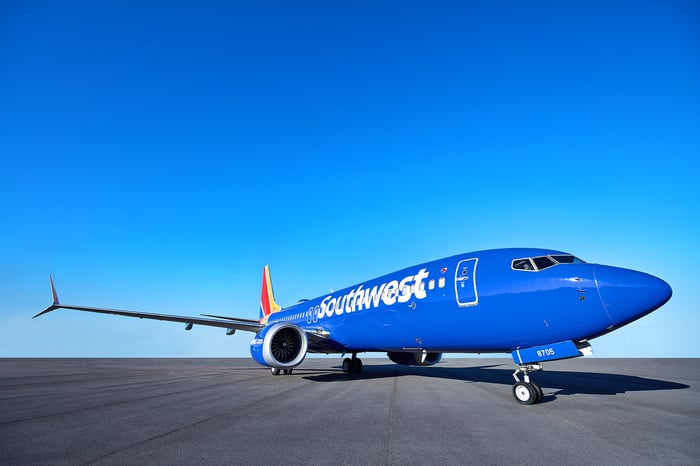Last week, Boeing (BA -0.43%) and Airbus (EADSY -0.91%) both reported their order and delivery results for the month of May. Boeing posted another month of solid order activity as it tries to recover from a steep plunge in its backlog during 2019 and 2020. But while Airbus continued to lag in new orders, the European aerospace giant maintained its biggest advantage over Boeing: It's still delivering jets at a respectable pace.
Boeing leads on orders again
Last month, Boeing received 73 new firm aircraft orders. The biggest by far came from Southwest Airlines (LUV 0.70%), which exercised 34 options for 737 MAX 7 jets to be delivered next year. Alaska Air also exercised options for 13 additional 737 MAX 9 deliveries in 2023 and 2024.
These orders were partly offset by bankrupt carriers Aeromexico and Norwegian Air Shuttle canceling 737 MAX orders. Nevertheless, Boeing's commercial aircraft backlog increased to 4,121 units at the end of May, up from 4,045 a month earlier. While the total number of unfilled orders barely budged during the month, Boeing reduced its reserve for orders that it deems likely to fall through, driving the backlog increase.

A Boeing 737 MAX in the Southwest fleet. Image source: Southwest Airlines.
Airbus received orders for just seven jets last month: two A320neos and five A350-900s. Factoring in the cancellation of three A350-900 orders, it booked four net orders for the month, well behind the pace Boeing set.
Year to date, Boeing has captured 177 net orders. By contrast, Airbus remains stuck in negative territory, with cancellations outpacing orders by 31 units.
Airbus is actually delivering jets
Boeing is getting more orders than Airbus this year, but Airbus is delivering far more jets than its American rival. In May, Boeing delivered just 17 jets: 11 737s, two 787 Dreamliners, and four freighters (one 747, two 767s, and one 777).
Meanwhile, Airbus delivered 50 commercial jets last month. As usual, the A320 family led the way, with 41 deliveries. The industrial giant also delivered four A220s, one A330neo, three A350s, and one A380.
May was a particularly bad month for Boeing in terms of deliveries. It had to pause 737 MAX and 787 Dreamliner deliveries for much of the month due to various quality control problems. That doesn't make Boeing's poor performance a fluke, though: It has experienced similar setbacks repeatedly in recent years.
In the first five months of 2021, Boeing has delivered only 111 jets, compared to 220 for Airbus. That huge gap in deliveries explains why Boeing is still burning cash, whereas Airbus returned to positive free cash flow last quarter.

An Airbus A320neo. Image source: Airbus.
Advantage Airbus
Amassing a big backlog of orders doesn't count for much if you can't deliver the planes. Right now, Airbus has the best of both worlds. First, it was delivering more jets than Boeing even before the 737 MAX grounding, and its advantage has widened considerably since then.
Second, Airbus ended May with 6,933 firm orders in its backlog, compared to the 4,121 for Boeing. While differences in U.S. and international accounting rules create part of the discrepancy, Airbus' backlog is likely at least 40% bigger than Boeing's on an apples-to-apples basis.
Additionally, Boeing has become overly reliant on a handful of key customers as it tries to rebuild its 737 MAX backlog -- especially Southwest Airlines. Following its recent order, Southwest has 365 firm orders, accounting for 11% of the 737 MAX backlog.
The heavy reliance on big-name customers will weigh on Boeing's margins and cash flow, as such customers typically command big discounts. Indeed, in its recent investor update, Southwest said that exercising the 34 737 MAX 7 options would increase its 2022 capital spending by about $800 million, equivalent to around $23.5 million per unit. That compares to the 737 MAX 7's list price of around $100 million. (Discounts in the 50% to 60% range are more typical.)
Southwest is likely applying existing pre-delivery payments to the purchase, making the actual sale price a bit higher. Still, the carrier has described its order book as "cost effective" -- and $23.5 million is well below breakeven for Boeing. Until the aircraft manufacturer shows that it can sustain a much higher delivery pace, with a more favorable customer mix, investors should continue to avoid the stock.





